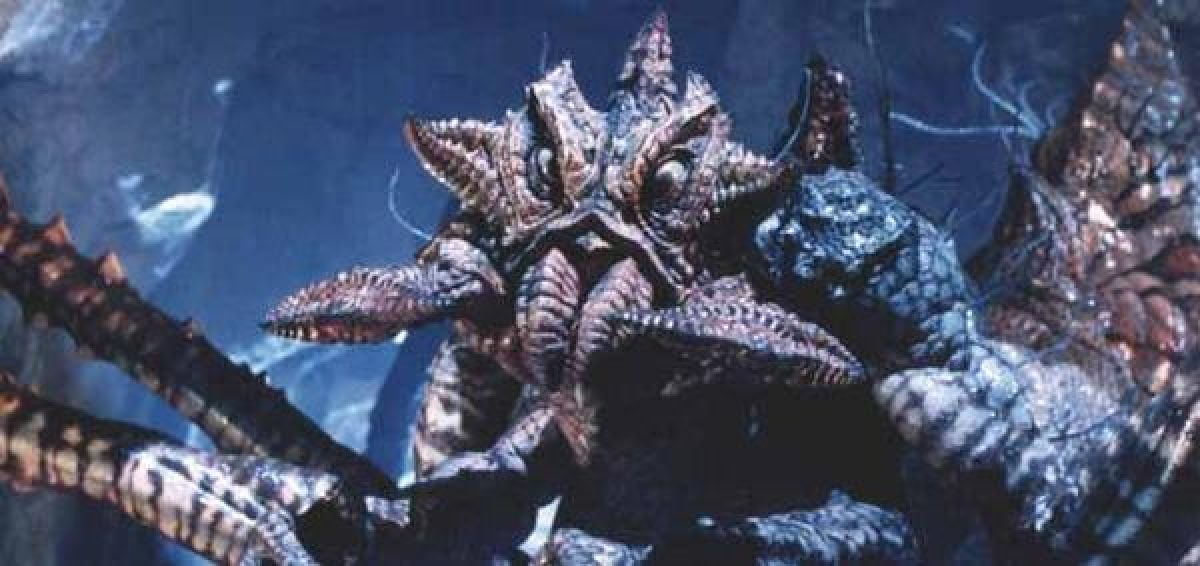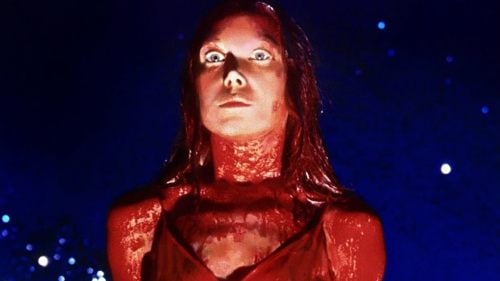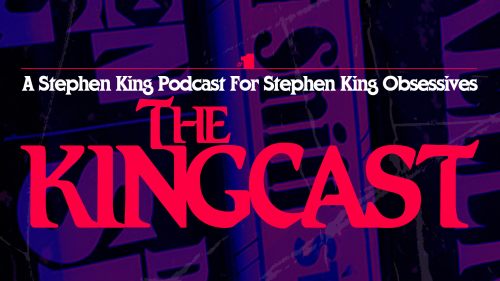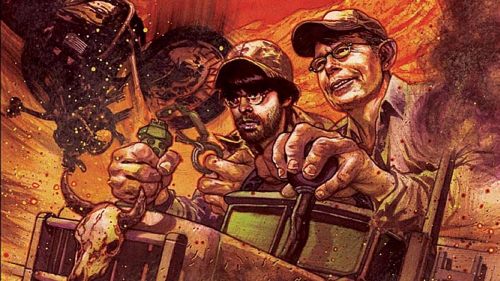Collins’ Crypt: The 1990 IT Still (Mostly) Floats
As I've mentioned before, my childhood fear of clowns stemmed from Poltergeist, but it certainly got an extension thanks to the ABC miniseries Stephen King's It, which was something that (if memory serves) my mother wanted to see more than I did when it aired in November of 1990. But I was the only one in the house who knew how to program the VCR (look it up, younger readers), and I already had a vague understanding of who Stephen King was thanks to Pet Sematary and Maximum Overdrive (hush), plus a few of my mom's books that looked way too "hard" (kid speak for "long") to read but had pretty scary covers, so I watched it with her. And it was freaking me out right off the bat, not with the "Georgie" scene that some folks seem to think was the first appearance of Tim Curry as Pennywise, but with the much briefer actual opening scene, where Pennywise murders a girl right outside of her home after appearing through the blowing laundry sheets.

Nightmare fuel!
I can't recall if the movie ever scared me too much to not continue like a few others, but it's doubtful since my mom was there to protect me from the evil monsters that would, I guess, crawl out of my TV. I DO know that I didn't tape over the film like so many others before it, and watched the movie probably at least a dozen times over the next couple years. But eventually the tape either DID get used for another film or simply wore out, because I have no memory of watching it again once I got to high school and actually started reading those King books that tantalized me over the years (my first was Insomnia, for whatever reason). And I never owned it on proper VHS or DVD, so when I saw the Blu-ray was on sale last week, amidst all the hoopla about the new film's trailer, I was curious to see if it held up to my quite fond childhood memories - not to mention how it compared to the novel (which I read about ten years ago). If I've said it once I've said it a thousand times - an adaptation's job is not to depict every single line of the book onscreen, but merely use it as the springboard to tell a tale built for cinema (or, in this case, television). So while obnoxious purists might want to shit on the miniseries for leaving out Henry's dad or the damned gang-bang, I just wanted to see if it was as good of a movie as pre-teen me seemed to think it was, and if the things they left out would have even fit in their version.
Well, no, it's not a great movie, but it's nowhere near as bad as its detractors like to claim. It's probably the best possible "faithful" adaptation one could make in 1990 for a major television network, in fact - they actually don't really change much at all, but leave out plenty, especially (obviously) the novel's more graphic and salacious elements. I mean, let's face it, even the upcoming R-rated film won't have the pre-teen group sex in the pipe, and on the commentary for the miniseries someone points out that even on-screen blood was fairly rare back then for the networks, so I don't know what people were expecting out of the adaptation given how/where it was presented. Their major flaw is - ironically - that they were trying to translate as much of King's 1,100 page novel as they could into a three hour movie, not wanting to go off book even though they were already forced to leave out giant chunks of it. As a result you're left with a Cliff's Notes or Wiki entry in movie form, with everything painted in broad strokes and a breathless pace that rarely allows the movie to feel lived in at all.
And where this approach hurts the most is, sadly, the forming of the bond between the Loser's Club. While some of them had existing friendships (Richie and Stan, Bill and Eddie, etc), they're not really fully formed until Mike joins them - and less than ten minutes later (a stretch that includes a flashforward to Stan as an adult, getting his phone call from Mike) they all go off into the sewer to fight It. In part two, adult Bill (Richard Thomas) arrives into Derry first and meets up with Mike, who has found his old bicycle - and then a flashback montage shows us the two of them riding it together as kids. It's a fine scene, but it's also the first time viewers have ever been informed that the two of them ever went off and played on their own, apart from the rest of the group. The bonds that these seven kids formed over that summer is part of what allows them to defeat It, but the film barely gets a chance to ever really show that they ever do much outside of battle It (or Henry Bowers). I can't help but wonder if Tommy Lee Wallace and Lawrence D. Cohen (the latter a King veteran thanks to Carrie) would have been better off re-imagining the core group as new characters and whittling the number down to a more manageable four or five, while retaining the rest of the basic narrative. This would have allowed them to let these bonding scenes breathe a bit and really hammer home the idea that they're stronger together.

Plus, the two timelines means everyone gets introduced twice, essentially, so you're talking about what is essentially fourteen major characters, plus a number of supporting ones. Not to mention, you know, the plot itself, so we're talking about far too many moving parts for a three-hour movie. It's worth noting that The Stand novel (the expanded version) is almost exactly the same length as It, but got twice as many hours to tell its story a few years later. Hell, even The Shining miniseries was longer and that book's only half as long as It! The makers of the new film have the right idea, to make two complete films (the one coming in September has no "present day" scenes - the adults haven't even been cast), but even then I'm not sure if they can do the book justice with a two and a half hour feature, if including everything and everyone is still the goal. Even shorter novels see their characters combined or removed for feature adaptations, so I'm not sure why they can't do the same here when dealing with one of the longest novels in modern history.
That said, Wallace and his casting folks did assemble a fine group of actors for both the kids and the adults. We can argue all day about whether or not the children could possibly grow up to look like their (more famous) adult counterparts (most are acceptable, but the two Bens... not so much), but they're good in their own time(s), and have terrific chemistry, which helps a lot with the aforementioned speed-racing through their bonding time. Just because we don't get to see much of their interaction unless they're going off to fight It (or hugging; these folks hug a LOT) doesn't mean we can't buy them as friends, and as an older guy I found myself quite charmed by the Chinese restaurant reunion. I myself went to a reunion with my grade school friends a couple years ago, with folks I hadn't seen in twenty years, and it felt a lot like what I see in the movie: the connections are still there even if you haven't kept in touch even enough to know if someone was married or had kids or whatever.
Indeed, I spent a lot of time on this long-time-coming revisiting of the film being amused (and occasionally freaked out, but I should note I watched it late at night and was drinking some whiskey) at how my own memories of the film mirrored the characters' memories of their childhood, as I'd recall certain scenes with crystal clarity, but others were a blur. Up until a few days ago, if you asked whether or not the movie retained Beverly's abusive husband I would have told you it didn't (it does), but as soon as they cut to New York I not only knew it was time to see John Ritter as Ben, but also that he would drop an award when he drunkenly stumbled out of his car. Other things would come flooding back seconds before they occurred, including memories of merely watching the film, like my friend Matt doing a (probably bad) impression of Pennywise's "Wa HEH! Wa HEH!" laugh in the library scene, or how I'd sing the McDonald's "Recital" lyrics along with the scene where Bill's mom plays "Fur Elise" on the piano. None of these are essential memories, of course (if I were in Dreamcatcher, I'd be filing them away in the memory warehouse to make room for more important things), so it's crazy to think how they're all kinda tucked away in the brain for whatever reason, being accessed on the same week I inexplicably forgot my debit pin and tried the one for my voicemail five or six times before realizing my error.

One thing I almost completely forgot was that the movie DID include some non-Pennywise incarnations of It besides the spider (even 10 year old me knew that spider looked goofy, by the way). I vaguely recalled the werewolf scene, but Stan's encounter with the Mummy version is a scene I had almost no memory of even though it's kind of one of the scarier moments in the movie, and while I remembered that Bev's house was now owned by a creepy lady, I didn't recall the old man mask version that chases her (halfheartedly) out the door. And then there's that amazingly out of nowhere dog in the mental institution, wearing Pennywise's ruffled clown shirt and killing the orderly (speaking of this scene, now that I've read the book I understand why he has a roll of quarters). The book has something like a dozen incarnations, including a Frankenstein's monster and a leper, but the movie streamlined a lot of that in favor of Pennywise, and I can't really blame them. In a career full of memorable performances, it's one Curry's best, and as I didn't really know who he was last time I watched the movie (Clue and maybe Worst Witch were pretty much all I knew him from) it was fun to see how fully he disappeared in the makeup. There's really only one scene in the movie where I can see the "real" Curry kind of peeking through (in the sewer encounter with the kids, when he's talking to them prior to getting the "battery acid"), otherwise I'm not even sure I'd know it was him.
Another person I have far more appreciation for now than I did then is director Wallace, who is best known for his feature sequels (Halloween III, Fright Night Part 2, and Vampires: Los Muertos), all of which are underrated and deserved a better fate than they got. This gave him his biggest spotlight by far (the film was watched by 30m viewers; Halloween III sold less than five million tickets), and it's a shame he didn't get a chance to do another King series or feature; I can't help but wonder if his version of The Stand or The Shining would have improved on the Mick Garris ones, as I think he's a stronger filmmaker. On the commentary, the cast members that are present (Ritter, Thomas, Tim Reid, and Dennis Christopher) all note how dedicated he was and how much leeway he gave the actors (and extensive rehearsal, rather rare for a TV film), and it's worth noting that he's worked with a number of them again on other television projects. He says on the commentary he's not a hardcore Stephen King fan (he only had read a couple, It not among them, prior to getting this gig), and I think that may actually be a good thing - a hardcore fan will be trying to please everyone and cram everything in, whereas someone who didn't really know the book won't be blinded by it and instead just commit to making a good movie.
When I finished watching the movie I rewatched the trailer for the upcoming new adaptation from Andrés Muschietti, and realized that film has a unique hurdle to clear, in that while it may do a better job at fleshing out the characters and depicting each of their specific fears, they can't really overcome twenty-seven years of nightmares Tim Curry has given the target audience (and yes, I love that the two movies are 27 years apart - the exact amount of time between Pennywise returns in the novel). Nothing against Bill Skarsgård, but he's not a powerhouse or one-of-a-kind type like Curry, so even if they're improving on everything else, will the new film pale to the 1990 version simply because it couldn't deliver on the main attraction? You often see Curry's Pennywise inked on horror fans' skin or sitting alongside the big-screen titans like Freddy and Jason in various pieces of fan art, because he's struck that much of a chord and helped elevate the uneven movie into one that's largely considered a win. Most likely, it will have its pros and cons, which is fine - better two movies have their merits than one being made worthless because of the other's existence. And besides - the true test will be whether or not Muschietti's film is still worth watching or writing about in thirty years, giving adults the same nightmares they had as children when they snuck into It.



